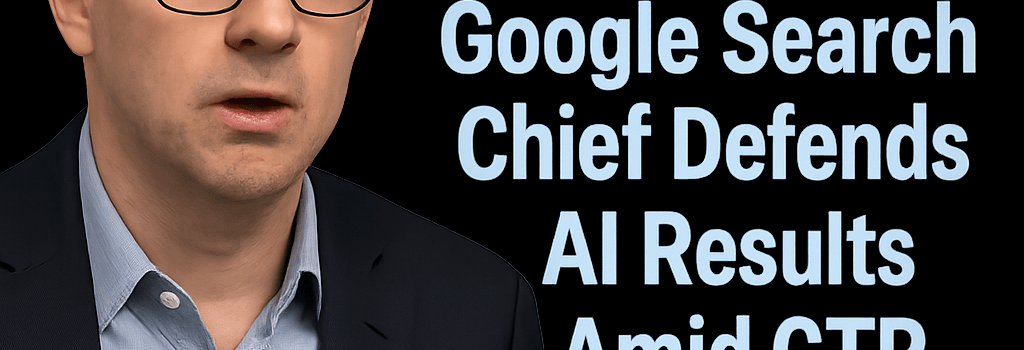Google Search Chief Defends AI Results Amid CTR Concerns

In a detailed blog post published August 2025, Google’s Head of Search, Liz Reid, addresses mounting concerns that AI-powered features in Search are eroding web traffic. Reid argues that not only have overall clicks held steady but AI overviews are improving user engagement and delivering higher-quality traffic.
Background: Pew Research Findings and Google’s Response
A Pew Research Center study earlier this year observed that queries invoking AI Overviews saw a 20–25% drop in click-through rates compared to traditional results. Critics raised alarms about a “zero-click” future, where users obtain answers directly on the SERP (Search Engine Results Page) without visiting publisher sites.
Google’s rebuttal highlights:
- Stable Total Organic Click Volume: Year-over-year data shows aggregate organic clicks remaining within a ±3% variance band.
- Search Volume Growth: AI features have driven a 15% increase in daily queries since SGE (Search Generative Experience) rolled out globally.
- Higher-Quality Clicks: Measured via Dwell Time and Bounce Rate improvements, indicating deeper engagements.
Technical Deep Dive: How Click Metrics Are Measured
Measuring click metrics in the context of AI-enhanced search involves several layers:
- Event Logging: Google logs
click_eventandimpression_eventin BigQuery with sub-millisecond timestamps. - Dwell Time Calculation: Calculated as
t_exit – t_click, with thresholds distinguishing short visits (<5s) from engaged visits (>30s). - Machine-Learned Relevance Scoring: The RankBrain and MUM pipelines adjust real-time ranking weights based on aggregated CTR and dwell time metrics.
- A/B Testing Framework: Google continuously experiments with different AI Overview templates—text blobs, list summaries, and micro-snippets—using an internal tool called Experimenter.
Expert Opinion
“Zero-click is a misnomer if you consider the value exchange. Google’s AI layers drive more frequent query reformulations and deeper sessions,” says Dr. Clara Nguyen, a former Google engineer and current search analytics consultant at Searchlytics.
Uneven Benefits: Winners and Losers in the Web Ecosystem
Reid acknowledges that not all publishers share equally in this click stability. Key observations include:
- Reddit Partnership Impact: Since the 2024 deal, Reddit’s daily active users jumped 21%, and its pages now appear in 35% of AI Overviews for community-driven Q&A.
- SEO Cannibalization: Niche review sites report a 10–15% drop in top-position clicks, often replaced by major brand domains or aggregated knowledge panels.
- Regulatory Oversight: Under Europe’s Digital Markets Act (DMA), Google must clearly label AI results and maintain a visible organic link section to ensure fairness.
These disparities underscore that aggregate click volume masks distribution shifts favoring large platforms and AI-friendly content formats.
Future Trends and Recommendations
Looking ahead, Google hints at several initiatives:
- Personalized Summary Layers: Using federated learning to tailor AI Overviews to individual interests without sacrificing privacy.
- Publisher Analytics API: A forthcoming API that will allow site owners to access anonymized AI‐overview performance metrics.
- Contextual Ad Reintegration: Embedding inline ads in AI snippets to preserve monetization pathways for creators.
Industry observers advise site operators to:
- Optimize content for featured snippets with structured data (
schema.org). - Invest in longer-form, multi-media pieces that encourage dwell time.
- Monitor Google Search Console’s new AI performance report to track overview impressions vs. clicks.
Conclusion
Google’s data suggests AI-driven search features are not decimating click-throughs overall. However, without full transparency on metrics, the debate is far from settled. Both Google and publishers face a shared challenge: ensuring AI enhancements enrich the web ecosystem without disproportionately diverting traffic to a handful of winners.